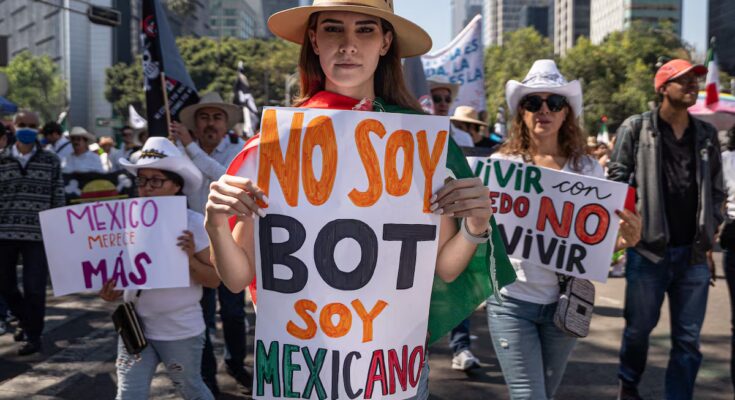Saturday showed the disturbing metamorphosis of what we used to understand by opposition. That moving entity, accustomed to defining itself by contrast, returned to the scene transformed into something minor. A furious clamor occupies its small space.
No news of the outraged young people who vowed to flood the Paseo de la Reforma dressed as pirates. In his absence, an old procession advanced from the Angel to the Zócalo: adults clinging to the illusion of a still time that could halt their decline.
An entourage of Hook captains dressed in Peter Pan outfits, attentive to the ticking clock in the crocodile’s belly.
And it’s not as if there is a lack of young people with real problems or legitimate questions about the direction of the country. They exist, but on Saturday they chose not to fuel the farce.
Those who intervened were the usual ones: the same stubborn ones who accompanied every attempt at reform by the opposition.
The most recent rival attempt included persistence and mutation. Continuity with change.
Continuity lived in a lie. Faced with reality, exemplary citizens circulated videos of other people’s marches to inflate their discouraged expedition; false images warning of snipers and old theories about excessive use of force. They resorted to old repressions – 1968, Ayotzinapa – to recriminate various theses.
They persisted in disguise. Slaves to the discredit of their own brand and with understandable modesty, they wore foreign masks with their necks raised.
The confusion remained intact. Weakened to the core of their foundations, they have omitted any clear definition of themselves and their direction.
The craze for adopting other people’s coats of arms also continued. Who could explain to Carlos Manzo that his cause ended up distorted and absorbed by the spokespersons he disowned during his lifetime? How embarrassing would it be to see those shady people show off hats in their profile photo.
Its insignia was stolen by opponents of the proletariat. Opportunists who would never have noticed him.
But not everything was imitation or repetition. The moribund opposition – cornered by its own attrition – has been forced to introduce something new to prolong its declining existence.
The opposition’s metamorphosis has involved adulterating its internal ethos, hiding its most compromising leaders and doubling down on its stridency to move it into darker areas.
Alone on Cerro de las Campanas they launched what could be their final flash: the last crevasse preceding the fall.
The result is an opposition without clear leadership, replaced by a fragmented chorus of unpresentable people who feign spontaneity to hide the total absence of leadership or, even worse, the shame of nominating their members.
The most alarming – and most visible – change is in the tone: a combative narrative. Divine wrath. The political opponent has been degraded to an existential enemy, a subject with whom one cannot argue but against whom it is necessary to start a crusade. There were extremist banners, Nazi graffiti, insults directed at the president, explicit calls for foreign intervention and professional provocateurs.
It’s called resistance to an offensive belligerent.
And when there are no proposals capable of convincing the majority, immediate exit seeks to impoverish the debate. If they cannot prevail with ideas, they will try to do so by destroying the conversation, leaving the table so that no one can participate.
Condemned to have no more life, they try to send others into the valley of death.
This was the tacit agreement of the weekend march: anything goes as long as it discredits a deeply popular government. Everything is worth recovering a little of what – in justice – they have lost.
What happened on Saturday, more than a protest, was revenge: a settling of accounts for an old grudge.
With this bleak prospect ahead, and subject to the new extremes it will reach in the future, the opposition is going through particularly dark times. On Saturday, they amputated some of their diminished legitimacy and, in doing so, they also severed a fragment of the democratic fabric.
Without its own legitimacy, without a project and without figures capable of connecting beyond its immediate sphere, the opposition has chosen to slide towards a new extreme.
Frightened by the south, they turned north.
That opposition – with its continuities and its changes -, demoralized, visceral, prisoner of its own fear, offers Morena an unexpected opportunity: the possibility of repairing what can be repaired, taking revenge where it has failed. Correct course and demonstrate – by contrast and without fanfare – that they are not the same as them.



